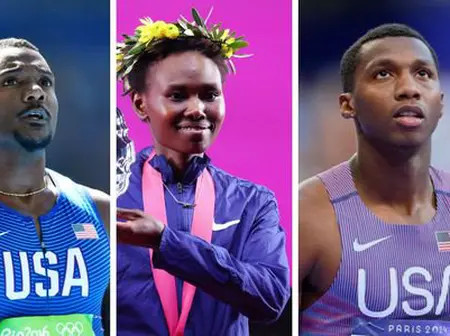Top 10 Biggest doping scandals in track & field history
Justin Gatlin, Erriyon Knighton, and Ruth Chepng’etich are among the major athletes whose doping scandals have repeatedly damaged the integrity of track and field.
The integrity of track and field has been repeatedly challenged by doping scandals involving some of the sport’s biggest names, including Justin Gatlin, Ruth Chepng’etich and Erriyon Knighton, among others.
Thousands of track and field athletes are always interested in making it to the top without training, and end up using performance-enhancing drugs that land them in trouble, stripping them of their titles and records.
This list highlights 10 of the most significant individual doping cases in track and field history, all of which led to confirmed bans and the annulment of results.
Ben Johnson’s positive test at the 1988 Seoul Olympics remains the most infamous doping scandal in the sport. After winning the 100m final in a world-record time of 9.79 seconds, the Canadian sprinter was found to have the anabolic steroid stanozolol in his system.
He was stripped of his gold medal and his world record. The scandal sent shockwaves around the globe, forcing the world to confront the reality of performance-enhancing drug use at the highest level of athletic competition.
At the 2000 Sydney Olympics, Marion Jones was a global superstar, winning five medals. Her success, however, was built on a lie.
As a central figure in the BALCO scandal, which supplied ‘designer steroids’ to elite athletes, Jones denied her involvement for years.
It was not until she faced perjury charges for lying to federal investigators that she confessed in 2007. She admitted to using steroids and, as a consequence, was stripped of all five of her Olympic medals and served a prison sentence.
In a major recent development, American sprinter Erriyon Knighton, a two-time Olympic finalist and World Championships 200m silver medallist, was banned for four years in 2025.
The ban was imposed by the Court of Arbitration for Sport (CAS) after he tested positive for the anabolic steroid, trenbolone.
Erriyon Knighton’s initial defence of meat contamination was rejected by the CAS, which found his claims to be statistically impossible. The ban will sideline him from all major competitions.
Kenyan marathoner Jemima Sumgong won the gold medal at the 2016 Rio Olympics, making history as the first Kenyan woman to do so.
Her triumph was short-lived. In 2017, she was banned after testing positive for EPO, a blood-boosting drug. Her attempt to justify the positive test with a fabricated medical story was rejected by anti-doping authorities.
For both the doping violation and lying, her ban was extended to eight years, a penalty that cemented her downfall and highlighted the persistent issue of doping in Kenyan distance running.
Kenyan middle-distance runner Asbel Kiprop, a three-time world champion and Olympic gold medallist in the 1500m, saw his career end in disgrace in 2019.
At the time, Asbel Kiprop was handed a four-year ban for testing positive for EPO. Despite his claims that the test was tampered with, the Athletics Integrity Unit confirmed the positive test.
Asbel Kiprop’s ban was a major blow to the integrity of Kenyan athletics and a sad end to a once-celebrated career.
Kenyan marathon world record holder Ruth Chepngetich has been provisionally suspended after a positive test for hydrochlorothiazide (HCTZ), a diuretic and masking agent.
The positive test came after she set a new women’s marathon world record. The anti-doping authorities confirmed her positive test, and her case is ongoing.
The incident has cast serious doubt on Ruth Chepng’etich’s record and further damaged the reputation of Kenyan distance running.
American distance runner Mary Decker Slaney, a celebrated athlete of the 1980s, faced a doping ban late in her career.
In 1996, at the age of 37, a urine sample showed an elevated testosterone-to-epitestosterone (T/E) ratio. While she argued that the test was flawed for older female athletes, the international sports tribunal ruled against her.
She was retroactively banned for two years and stripped of her silver medal from the 1997 World Indoor Championships.
American sprinter Tim Montgomery, a key figure in the BALCO scandal, never failed a drug test himself, but evidence gathered during the investigation showed he had received and used performance-enhancing drugs from the lab.
Based on this evidence, the Court of Arbitration for Sport banned him for two years and annulled all his records, including his former 100m world record.
His case was a landmark ruling, proving that athletes could be convicted of doping without a traditional positive test.
American sprinter Justin Gatlin’s career has been defined by his two confirmed doping bans. Following a one-year ban in 2001, he tested positive for testosterone in 2006.
This second offence led to a four-year ban and the stripping of his then-world record. Justin Gatlin’s eventual return to the sport and his later victories continued to fuel debate about second chances for athletes with a confirmed history of doping.
The American record holder in the 100m, Tyson Gay, was banned for one year after a confirmed positive test for an anabolic steroid in 2013.
He admitted to the use of a banned substance and cooperated with the investigation, which led to a reduced suspension.
As a consequence, he was stripped of all his results dating back to July 2012, including the silver medal he won with the U.S. 4x100m relay team at the 2012 London Olympics.
His confirmed doping violation served as a major disappointment to fans and a stark reminder of the prevalence of cheating in the sport.

Leave a Reply